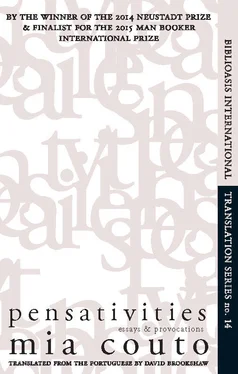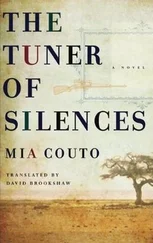Mia Couto
Pensativities: Selected Essays
Mia couto is Mozambique’s best-known writer internationally, and his fiction now appears in more than twenty languages. His first published literary work, in 1983, was as a poet, a genre he has continued to cultivate over the years. His international readership is most familiar with his novels and short stories. Couto is also a highly respected public intellectual, who has written and spoken on a wide range of topical issues relating to African politics and culture. This book is designed to introduce readers of English to a selection of such writings, taken from three collections of essays and autobiographical texts published in Portuguese under the titles of Pensatempos (2005), E se Obama fosse africano? e outras interinvenções (2009), and Pensageiro frequente (2010).
Couto began his writing career as a journalist, serving as director of the Mozambican state news agency, and editor of a daily newspaper and a weekly news magazine in the years immediately following the independence of Mozambique in 1975. He still publishes articles in the press, and his most consistent contributions over the years have taken the shape of the crónica: a flexible form whose genre falls somewhere between that of the opinion column, the short story, and the personal anecdote, and whose tradition is highly prized in the Portuguese-speaking press.
The importance of the crónica harks back to the emergence of the press in nineteenth century. The genre enabled authors to make social or political comments on topics of popular interest, often using anecdote or the story of a personal experience as their starting point. In this way, serious and sometimes contentious issues could be addressed in a light-hearted, entertaining and often oblique manner, in an environment where democratic institutions and the notion of a free press were still notably fragile. Some of the most widely respected writers of fiction also wrote chronicles for the press in nineteenthth-century Portugal and Brazil. Mia Couto follows in this tradition, and his dedication to what might be considered a hybrid genre is reflected in the fact that some of his chronicles have even been included in his collections of short stories. The world of creative writing and of reportage overlap and often mesh in his work, and this is especially apparent in this collection, in pieces such as “The China within Us,” “Land of Water and Rain,” and “A Boat in the Sky over Munhava,” which contain anecdote, poetic childhood memories, and implied topical comment. They invite us to ponder on the complexities of identity, the contrasts between urban and rural life in a developing country like Mozambique, and the challenges of nature conservation. Indeed, ecological issues are a frequent topic in Mia Couto’s essays, as he trained as a biologist, and works in the field of ecological conservation.
In addition to crónicas , this collection contains a wide range of Mia Couto’s speeches, lectures, and talks. These texts give us his thoughts on African literature and culture, the erroneous views that many in the West have of Africa, and the nefarious effects such views have on the mentalities of emerging elites on the continent. (One such effect includes the spread of what he calls “developmentalese,” a linguistic and cultural depenendce on outsiders’ prescriptions for development. Couto contends that a younger generation of Africans must overcome this submissiveness to western perceptions, and to do so by finding their own solutions to issues of culture, economics, social opportunity and equality, or natural conservation. Two of the texts also discuss the influence of Brazilian literature on authors of his generation, as Brazilian writers from the mid-twentieth century had adapted the Portuguese language to better reflect their cultural and linguistic diversity. Mozambican writers from the 1960s to the 1980s took that strategy as a model through which to explore African realities. At the same time, a recurring theme in these essays is Couto’s rejection of essentialist views of identity, and of so-called African authenticity. For Couto, identity is fluid, prone to change, and above all a narrative, he believes that, Africans should accept their cultural hybridity as a creative force and an expression of their own contribution to modernity.
Readers familiar with Couto’s fiction will find material in these essays that complements the themes and ideas suggested in his novels and short stories. Those entering Couto’s world through these essays will discover here an essential contribution to contemporary debates about Africa.
— David Brookshaw
For years, I taught classes in various faculties of the Eduardo Mondlane University. My teaching colleagues complained about the progressive decline in the preparation of students. I noticed something that, for me, was even more serious: an ever greater remoteness among these young people from their own country. When they left Maputo to carry out fieldwork, these youngsters would behave as if they were emigrating to a strange and hostile universe. They didn’t know the languages, they were ignorant of the cultural codes, they felt dislocated and yearned for Maputo. Some of them were haunted by the same spectres as colonial explorers: wild animals, snakes, invisible monsters.
These rural areas were, after all, the space where their grandparents and all their ancestors had lived. But they didn’t see themselves as inheritors of this patrimony. Their country was somewhere else. Worse still: they didn’t like this other nation. And what was still more serious: they were ashamed of being linked to it. The truth is simple: these young people are more at ease in front of a Michael Jackson video than in the garden of a Mozambican country dweller.
What’s happening, and this seems inevitable, is that we are creating different citizenships within Mozambique. There are various categories of these: there are the urban citizens, inhabitants of the upper city, those who have been to South Africa more often than they have to the suburbs of Maputo. Then there are those who live on the periphery, the inhabitants of the so-called lower city. And then there are the rural dwellers, those who are a kind of distorted image of the national self-portrait. These people seem doomed to have no face, to speak through the voices of others.
Whether or not the creation of different citizenships (or, more seriously, of different degrees of the same citizenship) is problematic depends on the ability to keep the differing segments of our society in dialogue. The question is: do these different Mozambiques speak to one another?
Our richness derives from our willingness to carry out cultural exchanges with others. President Chissano, in a very recent text, asks what special quality Mozambique possesses, and why it attracts so many visitors. A special je ne sais quoi does, indeed, exist. This magic is still alive. But no one thinks, perfectly reasonably, that this power of seduction derives from our being naturally better than others. This magic originates in our ability to exchange culture, to produce hybridities. It originates in our capacity to be ourselves while being others.
I’ve come here to talk about a very private dialogue, which I very rarely talk about. I am referring to our conversation with our own ghosts. Time has shaped our collective soul by means of three materials: the past, the present, and the future. None of these materials seems to have been made for our immediate use. The past was badly packed and has reached us damaged, loaded with myths and prejudices. The present comes dressed in borrowed clothes. And the future has been commissioned by interests that are alien to us.
Читать дальше












